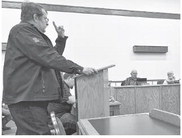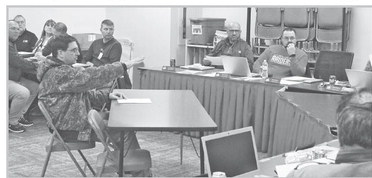Wisconsinites reminded of protected tribal right to fish
The Wisconsin Department of Natural Resources (DNR) reminds Wisconsinites of the protected tribal right to fish in certain Wisconsin waterways and the legal consequences they could face if found interfering with that right during the Ojibwe spring fishing season.
“The safety of Ojibwe fishers is a top priority for the DNR,” said DNR Secretary Karen Hyun. “The agency fully supports legally protected Ojibwe treaty rights and tribal sovereignty. We will swiftly act on incidents of violence and harassment against tribal citizens.”
Each tribal fishing season, tribal citizens harvest using various methods, including spearing and netting. The harvest usually begins shortly after the ice melts, typically by mid-April. This year, the season is expected to begin earlier due to the mild winter Wisconsin has experienced. The tribal harvest is not a date-regulated activity so there is neither an open nor closed season. The DNR collaborates with the Ojibwe tribes to uphold these rights “Tribal members must be able to safely exercise their right to hunt, fish and gather in the Ceded Territories without unlawful interference,” said Attorney General Josh Kaul. “Local law enforcement as well as the Great Lakes Indian Fish and Wildlife Commission can help ensure that tribal members’ rights are protected during the spring fishing season.”
Part of the collaboration between the DNR and the Ojibwe tribes includes working together to set a safe harvest limit for every walleye and muskellunge lake in the Ceded Territory. These safe harvest limits ensure that the walleye and muskellunge harvests do not adversely affect each lake’s fishery.
There are 2,300 lakes larger than 25 acres in the Ceded Territory, including 919 walleye lakes and 623 muskie lakes. Each year, the Ojibwe tribal citizens fish a portion of these lakes outside of reservation boundaries during their spring harvest season. Tribal citizens rely on these lakes to preserve their cultural heritage and also act as a vital food source for their communities.
By March 15 of every year, each tribe declares how many walleyes and muskellunge it intends to harvest from each lake based on the safe harvest limits. Harvest begins shortly after the ice melts, with nightly fishing permits issued by the tribes to their members to harvest a specific number of fish, including one walleye between 20 and 24 inches and one additional walleye of any size.
All fish that are taken are documented each night by a tribal clerk or warden who are present at boat landings. Once the declared harvest is reached in a given lake, no additional permits are issued for that lake, and the harvest ends. The Great Lakes Indian Fish and Wildlife Commission (GLIFWC) provides daily reports to the DNR for all fish harvested off-reservation by spearing or netting in the Ceded Territory.
In the mid-1800s, the Lake Superior Ojibwe Tribes ceded more than 22,000 square miles of tribal territory across Northern Wisconsin, including all or parts of 30 counties through a series of treaties with the United States federal government.
When the Ojibwe ceded lands to the federal government, they maintained their rights to hunt, fish and gather off reservation land within the Ceded Territory. However, after Wisconsin became a state, state and local officials frequently assumed statehood superseded Ojibwe treaty rights and regulated or prohibited off-reservation hunting, fishing, and gathering by tribal members.
In 1983, a federal court ruling reaffirmed the Ojibwe had the right to hunt, fish and gather off-reservation in the Ceded Territory, including the right to catch fish by spearing and netting.
It is illegal to interfere or attempt to interfere with tribal citizens who are exercising treaty rights, including the spring harvest of walleyes. Prohibited conduct against any tribal citizen includes, but is not limited to, stalking, obstructing access to lakes, recklessly operating watercraft, creating hazardous wakes, threatening violence and committing acts of violence.





